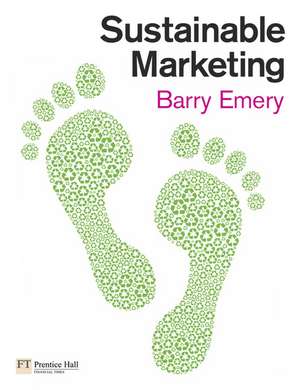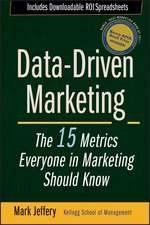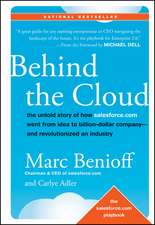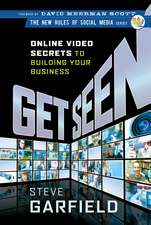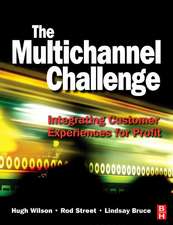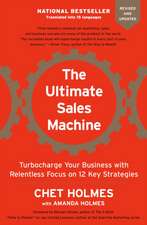Sustainable Marketing
Autor Barry Emeryen Limba Engleză Paperback – 22 dec 2011
The author starts by considering the background of traditional marketing in order to understand the changes that have occurred over recent times and their significance. From corporate social responsibility to societal and green marketing movements, leading to the development of sustainable marketing practice, this book is the most complete and accessible introduction to Sustainable Marketing on the market.
Key themes covered in the book include:
- Current developments in the marketing environment and their role in stimulating or impeding the progress of sustainability
- The nature of consumption in relation to sustainability
- The underlying attitudes of consumers towards sustainable consumption
- The use of social marketing for planning and implementing behavioural change in consumers towards a more sustainable lifestyle
Preț: 566.65 lei
Preț vechi: 651.33 lei
-13% Nou
Puncte Express: 850
Preț estimativ în valută:
108.44€ • 112.98$ • 90.17£
108.44€ • 112.98$ • 90.17£
Carte disponibilă
Livrare economică 18 ianuarie-01 februarie 25
Livrare express 07-11 ianuarie 25 pentru 36.43 lei
Preluare comenzi: 021 569.72.76
Specificații
ISBN-13: 9780273723288
ISBN-10: 0273723286
Pagini: 336
Ilustrații: Illustrations
Dimensiuni: 187 x 244 x 19 mm
Greutate: 0.65 kg
Ediția:1
Editura: Pearson Education
Locul publicării:Harlow, United Kingdom
ISBN-10: 0273723286
Pagini: 336
Ilustrații: Illustrations
Dimensiuni: 187 x 244 x 19 mm
Greutate: 0.65 kg
Ediția:1
Editura: Pearson Education
Locul publicării:Harlow, United Kingdom
Cuprins
1
Marketing in the ethical environment:
The key role of marketing in the sustainable environment
Why should it matter?
Enhanced marketing definitions
Sustainable marketing
The Triple Bottom Line
People Planet Profit and The Three Es
Articles:
Does Marketing Attract Less Ethical Students?
Cases:
Cashmere with a conscience
Good Natured Juice
Apply it!
Persil Small and Mighty
Sharkah Chakra – The slow fashion Fairtrade specialist
Professional Practice!
New communications focus for Kellogg
Report back
Ecopreneur in focus
2
Understanding the external and internal environment:
From passing fad to present prerequisite
Environmental analysis
STEEPLE
Researching the sustainable marketplace
The internal environment
Added-value chains
Stakeholder mapping and relationships
Multiple players
Campaigning traders and trading campaigners
SECTION 2:
Understanding changing behavioural beliefs
3
Consumer behaviour:
Understanding the influences on behaviour
Eco-attitudes
Hierarchy reshuffle for Maslow
Contradictory behaviours and levels of behaviour
The sustainable purchase decision-making process
True blue greens, Greenback greens, Sprouts… and degrees of (mis)behaviour
What women want
B2B – embracing sustainable behaviour
4
Changing behaviour:
The role of social marketing
Marketing for behavioural change - responsibility v. sacrifice
Campaigners, pressure groups and non-profits
Demarketing
SECTION 3:
Reaching decisions on sustainable markets
5
Segmentation:
How green are your consumers?
The new premium consumer – applying segmentation variables
Sustainable segments – subdividing the divided
Sustainable profiles: passionates, dutifuls, followers and the uninvolved
Market choice and targeting
6
Positioning:
Perception is reality
Developing a sustainable position
Ethical fig leaves
Differentiation - niche or mainstream?
Ethical role reversal
SECTION 4:
Making decisions on sustainable marketing practice
7
The sustainable product
Levels of sustainable product
Cradle to cradle product strategy
Sustainable product standards
Packaging
8
Pricing
Ethical at what price?
Full cost / environmental accounting
Price sensitivity
The end of ‘free goods’
Costs, price and social equity
Can luxury brands go green?
9
Supply and distribution:
Redefining value in the chain
Reverse channel systems
10
Integrated Marketing Communications:
Informing consumers – use of the communications mix
Green filter
Greenwash
Sustainability reporting
How green is your billboard?
11
Sustainability on the net:
Global connectivity
The internet – the sustainable place to do business
E - ecobusiness benefits
Virals and blogs
SECTION 5:
Developing professional skills
12
Professional Practice:
More on getting started
Presentations and pitches
Dealing with client briefs
Dealing with data
Measuring for success
Web strategy
Writing research proposals and reports
Understanding the players, stakeholders and networks in your profession
CVs, self-marketing skills and interviews
Job types and specifications
EPILOGUE: The story goes on
Where to from here?
Marketing in the ethical environment:
The key role of marketing in the sustainable environment
Why should it matter?
Enhanced marketing definitions
Sustainable marketing
The Triple Bottom Line
People Planet Profit and The Three Es
Articles:
Does Marketing Attract Less Ethical Students?
Cases:
Cashmere with a conscience
Good Natured Juice
Apply it!
Persil Small and Mighty
Sharkah Chakra – The slow fashion Fairtrade specialist
Professional Practice!
New communications focus for Kellogg
Report back
Ecopreneur in focus
2
Understanding the external and internal environment:
From passing fad to present prerequisite
Environmental analysis
STEEPLE
Researching the sustainable marketplace
The internal environment
Added-value chains
Stakeholder mapping and relationships
Multiple players
Campaigning traders and trading campaigners
SECTION 2:
Understanding changing behavioural beliefs
3
Consumer behaviour:
Understanding the influences on behaviour
Eco-attitudes
Hierarchy reshuffle for Maslow
Contradictory behaviours and levels of behaviour
The sustainable purchase decision-making process
True blue greens, Greenback greens, Sprouts… and degrees of (mis)behaviour
What women want
B2B – embracing sustainable behaviour
4
Changing behaviour:
The role of social marketing
Marketing for behavioural change - responsibility v. sacrifice
Campaigners, pressure groups and non-profits
Demarketing
SECTION 3:
Reaching decisions on sustainable markets
5
Segmentation:
How green are your consumers?
The new premium consumer – applying segmentation variables
Sustainable segments – subdividing the divided
Sustainable profiles: passionates, dutifuls, followers and the uninvolved
Market choice and targeting
6
Positioning:
Perception is reality
Developing a sustainable position
Ethical fig leaves
Differentiation - niche or mainstream?
Ethical role reversal
SECTION 4:
Making decisions on sustainable marketing practice
7
The sustainable product
Levels of sustainable product
Cradle to cradle product strategy
Sustainable product standards
Packaging
8
Pricing
Ethical at what price?
Full cost / environmental accounting
Price sensitivity
The end of ‘free goods’
Costs, price and social equity
Can luxury brands go green?
9
Supply and distribution:
Redefining value in the chain
Reverse channel systems
10
Integrated Marketing Communications:
Informing consumers – use of the communications mix
Green filter
Greenwash
Sustainability reporting
How green is your billboard?
11
Sustainability on the net:
Global connectivity
The internet – the sustainable place to do business
E - ecobusiness benefits
Virals and blogs
SECTION 5:
Developing professional skills
12
Professional Practice:
More on getting started
Presentations and pitches
Dealing with client briefs
Dealing with data
Measuring for success
Web strategy
Writing research proposals and reports
Understanding the players, stakeholders and networks in your profession
CVs, self-marketing skills and interviews
Job types and specifications
EPILOGUE: The story goes on
Where to from here?
Textul de pe ultima copertă
Emery, Sustainable Marketing, draft blurb
Sustainability has quickly reached the top of the agenda for businesses and governments. All types of organisations, from multinationals to charities, recognise the need to engage with economic, social and environmental sustainability issues and marketing has a key role to play in driving this change.
This book explores the complex and challenging environment of sustainable marketing. Tracing the development of marketing through from the original marketing concept via corporate social responsibility, societal and green marketing movements, the author explains the evolution and growth of sustainable marketing practice providing the most complete and accessible introduction to sustainable marketing on the market.
Key themes covered in the book include:
· Current developments in the marketing environment and their role in stimulating or impeding the progress of sustainability
· The nature of consumption in relation to sustainability
· The underlying attitudes of consumers towards sustainable consumption
Marketing dilemmas: encourage you to problem-solve and put yourself in the place of a marketer facing challenging situations and devising potential strategies
Research skills: help to hone your marketing research skills by challenging you to investigate sustainable marketing issues
Getting started: provide helpful starting points when you are planning research tasks and exercises
Professional practice: encourage you to think about how you would apply theory to practice in a professional context
Snapshots and Cases: offer a wide range of mini-cases and full case studies from the world of marketing, fashion, retail, entertainment, tourism and hospitality, including Aga, Red Sky, Marks & Spencer, Primark, Muji and 360 Vodka, encompassing a wide range of national and international contexts
Apply it: short exercises that focus on specific aspects of sustainable marketing theory to allow you to apply your knowledge and evaluate your understanding and progress in each chapter
The book makes an ideal companion text for the Marketing (Emerging Themes) unit of the CIM’s Chartered Postgraduate Diploma in Marketing. Sustainable Marketing is essential reading for undergraduate and postgraduate marketing, business and management students on both general and specialist programmes, as well as for students of sustainable development.
Online resources
Go online to the website: www.pearsoned.co.uk/emery to access a variety of teaching resources to support this book.
About the author
Barry Emery is Senior Lecturer in Marketing at Birmingham City Business School, Birmingham City University, UK.
Pearson Education are pleased to be donating £1 from every sale of this book towards supporting the work of the International Tree Foundation
Sustainability has quickly reached the top of the agenda for businesses and governments. All types of organisations, from multinationals to charities, recognise the need to engage with economic, social and environmental sustainability issues and marketing has a key role to play in driving this change.
This book explores the complex and challenging environment of sustainable marketing. Tracing the development of marketing through from the original marketing concept via corporate social responsibility, societal and green marketing movements, the author explains the evolution and growth of sustainable marketing practice providing the most complete and accessible introduction to sustainable marketing on the market.
Key themes covered in the book include:
· Current developments in the marketing environment and their role in stimulating or impeding the progress of sustainability
· The nature of consumption in relation to sustainability
· The underlying attitudes of consumers towards sustainable consumption
- The use of marketing for behavioural change in consumers towards more sustainable lifestyles
- The changes required in marketing tactics to implement sustainability marketing strategies covering activities such as marketing communications, product development and supply chain management
- Planning for and managing sustainable marketing
Marketing dilemmas: encourage you to problem-solve and put yourself in the place of a marketer facing challenging situations and devising potential strategies
Research skills: help to hone your marketing research skills by challenging you to investigate sustainable marketing issues
Getting started: provide helpful starting points when you are planning research tasks and exercises
Professional practice: encourage you to think about how you would apply theory to practice in a professional context
Snapshots and Cases: offer a wide range of mini-cases and full case studies from the world of marketing, fashion, retail, entertainment, tourism and hospitality, including Aga, Red Sky, Marks & Spencer, Primark, Muji and 360 Vodka, encompassing a wide range of national and international contexts
Apply it: short exercises that focus on specific aspects of sustainable marketing theory to allow you to apply your knowledge and evaluate your understanding and progress in each chapter
The book makes an ideal companion text for the Marketing (Emerging Themes) unit of the CIM’s Chartered Postgraduate Diploma in Marketing. Sustainable Marketing is essential reading for undergraduate and postgraduate marketing, business and management students on both general and specialist programmes, as well as for students of sustainable development.
Online resources
Go online to the website: www.pearsoned.co.uk/emery to access a variety of teaching resources to support this book.
About the author
Barry Emery is Senior Lecturer in Marketing at Birmingham City Business School, Birmingham City University, UK.
Pearson Education are pleased to be donating £1 from every sale of this book towards supporting the work of the International Tree Foundation
Caracteristici
- Dilemmas: encourage you to problem-solve and put yourself in the place of a marketer facing challenging situations
- Research skills: help to hone your research skills by challenging you to translate principles into practice
- Getting started: provide helpful starting points for when you are planning research tasks and exercises
- Professional practice: encourage you to think about how you would apply theory to practice in a professional context
- Snapshots: offer a wide range of case studies from the world of marketing, fashion, retail, entertainment, tourism and hospitality, including Aga, Red Sky, Marks & Spencer, Primark, Muji and 360 Vodka.
- Apply it!: short exercises that focus on real sustainable contexts and allow you to apply your knowledge and evaluate information from different sources
